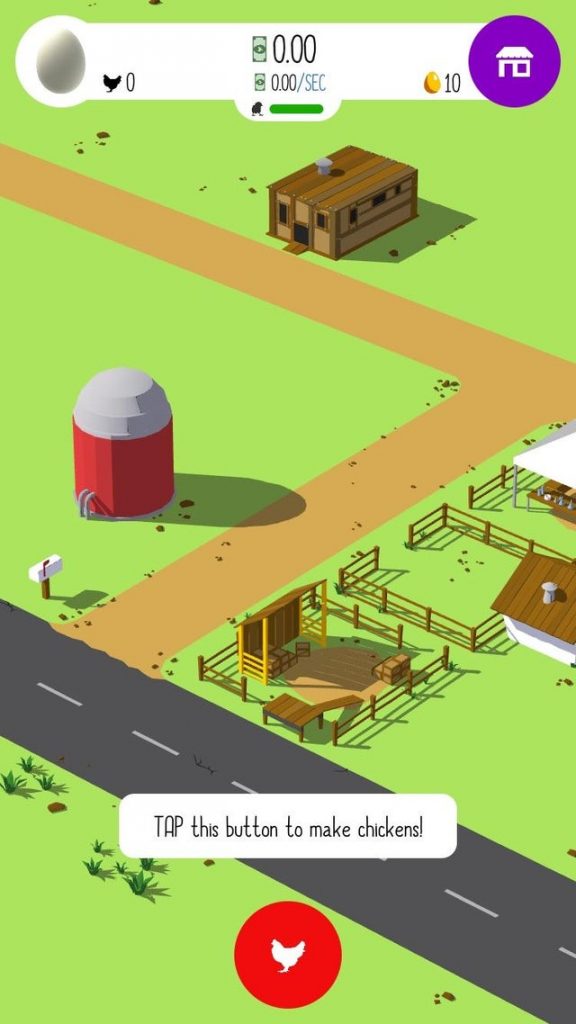Realizing that my addiction to play Egg Inc. is rooted in the simulation of financial success.
It was only a few months ago that an advertisement for some kind of game with chickens running around on a farm popped up on my phone while I was playing Sudoku in an app. Generally, I am annoyed by the thirty second interruption and therefore determined to resist the urge to download another application that will probably just waste more of my time. My boyfriend sitting next to me at the time was, however, intrigued by the chicken game and suggested that I download it so that we could try it out.
Fast forward to four hours later, and we were still playing the game while excitedly discussing how to get the most earnings from the chickens and how to level up to a new farm even faster. While it is embarrassing to admit it, we were absolutely obsessed, and had completely dismissed any other errands of that day.
“The Chicken Game”
Egg Inc. or “The Chicken Game”, as I refer to it as, is an Incremental game, which means that the player will have to keep clicking the screen in order to advance in the game.
The application of Egg Inc. displays a farm, which is your individual field to play on, and there are five crucial elements to this farm; the hatchery, the hen house, the shipping depot, the research center and the grain silos. You begin the game with the default “Edible Egg Farm”, where the eggs laid by the chickens have a relatively low value. As the eggs are delivered through the shipping depot you earn this value per egg.
The money you earn can be spent on improving the elements of your farm by investing in “research” in the research center. This way you can increase the value of the eggs, the egg laying rate, the amount of vehicles (to deliver more eggs faster), and other upgrades such as the capacity of the hen houses. It is also possible to invest in research to increase the amount of chickens entering the hen houses, so that you get more chickens even faster. When your farm reaches a certain value you can upgrade the farm to a different type of egg that has a higher starting value and restart the process of filling up the farm with chickens. Read more about Egg Inc. here.

My Experience with The Chicken Game
As of this moment in writing I have earned a total of 820.542 tredecillion from playing this game over a couple of months. I do not even know how I would begin to attempt to visualize that amount, but it is definitely beyond my imagination. Naturally, this amount is completely fictional, and the only “real” monetary value that was exchanged between me and this game is when I decided to pay the application 10€ to upgrade the function of the grain silo. The grain silo allows you to passively hatch more chickens for your farm and earn money while you are not using the application. After some serious self-evaluation, with recent instances of playing the chicken game for hours on end while it has no practical purpose for my life, I came to the realization that the game gives me a feeling of financial success that compensates for my real life financial desires. While I refuse to believe that wealth is the key to happiness and would not want to limit my life to capitalist endeavours, I revel in the simulation of gaining endless earnings from minimum effort.
Interestingly enough in an article from Paolo Ruffino from 2019 where he compares a different incremental game, AdVenture Capitalist, to “The End of Capitalism”, he finds that the game simulates the infinite cycle of Capitalism and is a good representation of how difficult it is to “break” or “end” that cycle, just as it is difficult to “finish” or “win” the game simulation. While for me personally Egg Inc. has given me a unrealistic experience of overwhelming financial success, incremental games have on a broader scale provided a new perspective on capitalism. Perhaps such simulations are key in questioning current financial structures and how much we let monetary values rule our lives.
Even though I have spent many hours on this application, without having attained any new skills nor created anything to show from it, I do believe that it has had a psychological impact on the way I perceive wealth and the need to acquire wealth. The digital simulation that Egg Inc. immerses me in while I am playing the game gives me enough financial satisfaction to the extent that I am no longer inclined to earn more money than what I need in real life. It might be that I am the only one experiencing this feeling, however if more people were content with experiencing financial success in a simulation, it could be easier to cope with the capitalist pressure to earn and consume more and more.



Recent Comments